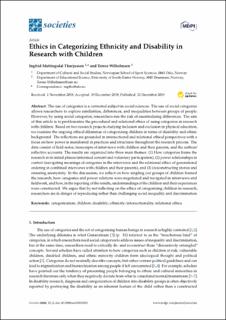| dc.description.abstract | The use of categories is a contested subject in social sciences. The use of social categories allows researchers to explore similarities, differences, and inequalities between groups of people. However, by using social categories, researchers run the risk of essentializing differences. The aim of this article is to problematize the procedural and relational ethics of using categories in research with children. Based on two research projects studying inclusion and exclusion in physical education, we examine the ongoing ethical dilemmas of categorizing children in terms of disability and ethnic background. The reflections are grounded in intersectional and relational ethical perspectives with a focus on how power is manifested in practices and structures throughout the research process. The data consist of field notes, transcripts of interviews with children and their parents, and the authors’ reflective accounts. The results are organized into three main themes: (1) How categories frame the research in its initial phases (informed consent and voluntary participation), (2) power relationships in context (navigating meanings of categories in the interviews and the relational ethics of generational ordering in combined interviews with children and their parents), and (3) (re)constructing stories and ensuring anonymity. In the discussion, we reflect on how singling out groups of children framed the research, how categories and power relations were negotiated and navigated in interviews and fieldwork, and how, in the reporting of the results, understandings of the children and their experiences were constructed. We argue that by not reflecting on the ethics of categorizing children in research, researchers are in danger of reproducing rather than challenging social inequality and discrimination. | en_US |

